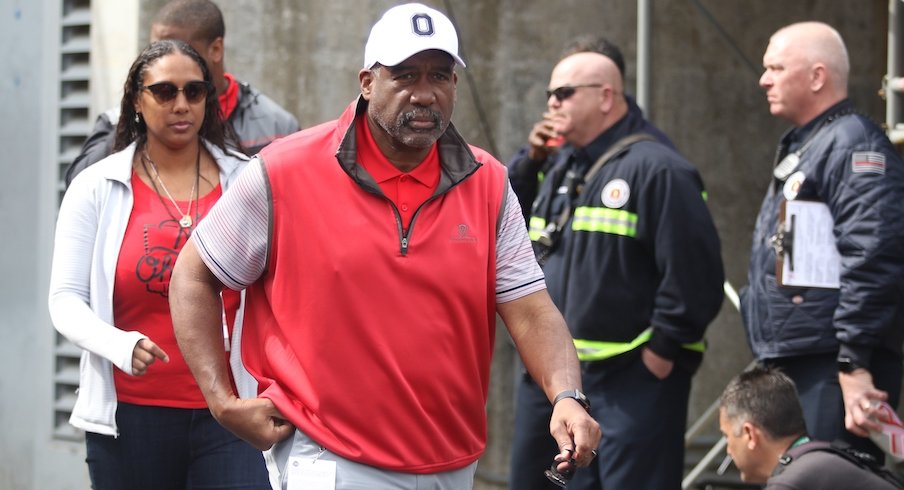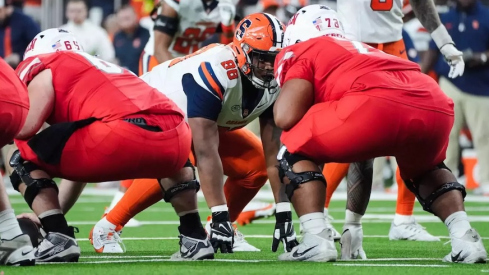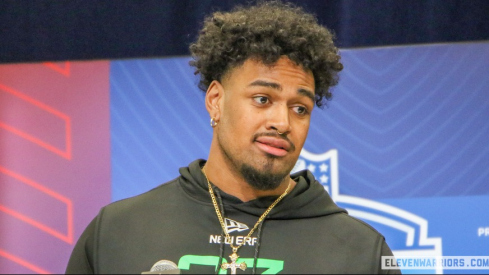When Gene Smith previously held a teleconference with reporters on May 20, the Ohio State athletic director said he was “cautiously optimistic” that the nation’s battle with the COVID-19 pandemic would get to a point that ultimately, Ohio State and other college football teams around the country would be able to play their seasons as scheduled this fall.
In a teleconference with reporters on Thursday just minutes after the Big Ten announced that its fall sports teams wouldn’t play any non-conference games this upcoming season, Smith made it clear he no longer had the same level of confidence about Ohio State playing any football this season at all.
“I’m really concerned. That is the question of the day. I am very concerned,” Smith said. “I was cautiously optimistic. I’m not even there now.”
Later Thursday afternoon, during an interview with BTN, Smith was even more blunt about the reality that Ohio State’s 2020 football season is in serious jeopardy.
“I can't reiterate enough the fact that we might not play,” Smith said. “We just might not. And I think that people need to understand that.”
Gene Smith (@OSU_AD) is an optimistic man. He wasn't so optimistic today.
Ohio State on BTN (@OhioStateOnBTN) July 9, 2020
He joins @BTNDaveRevsine to talk about his concern that there might not be a football season. pic.twitter.com/aUn7kt4QiK
Smith’s waning optimism about Ohio State playing football this fall comes as the result of continuing spikes in COVID-19 cases around the country. As of Wednesday, daily COVID-19 cases had increased over the past two weeks in 45 states, whereas the number of reported cases was decreasing in many states two months ago. Ohio State has also seen the number of positive COVID-19 cases increase within its own athlete population, which led OSU to pause voluntary workouts for athletes on Wednesday.
Like football coach Ryan Day also did on Thursday, Smith made a plea for people around the country to do their part and follow recommended protocols to limit the spread of COVID-19, which he believes have not been taken seriously enough throughout the United States.
“When you look at the behavior of our country and you consider that in May, we were on a downward trajectory with cases and our hospitals were creating opportunities for people to come back and get the care that they needed beyond COVID and elective surgeries and things of that nature, and now, we’re if not the worst in the world, one of the worst in the world,” Smith said. “So I’m concerned about where we are just across the board relative to management of the pandemic as individuals.
“I think our governor (Mike DeWine has) done a phenomenal job. He had us on a great trajectory downward. And we just didn’t respond to opportunities that were provided to us. So people need to follow the protocols and give our kids a chance to compete.”
Ultimately, Smith says Ohio State will prioritize the health and safety of its student-athletes above all else, which means COVID-19 must start to be contained if the Buckeyes are going to play sports this fall.
“First and foremost, we’re gonna follow the lead of our medical experts. Their advice has been great for us as we move through this process,” Smith said. “So we’ll just have to wait and see how our different environments manage the pandemic, and take their advice as we move forward.”
“I can't reiterate enough the fact that we might not play. We just might not. And I think that people need to understand that.”– Gene Smith on the possibility of a canceled football season
Big Ten commissioner Kevin Warren offered a similar sentiment on Thursday, saying that the conference is relying on its Task Force for Emerging Infectious Diseases as well as medical experts from each Big Ten school, but that progress must be made for fall sports to proceed forward even with conference-only schedules.
“This is not a fait accompli that we're going to have sports in the fall,” Warren said during an interview on BTN. “We may not have sports in the fall. We may not have a college football season.”
"We made a vow early on that, first and foremost, we would put the health, the safety and the wellness of our student-athletes at the center of all of our decisions."
— Big Ten Network (@BigTenNetwork) July 9, 2020
Kevin Warren talks the timing of the @bigten's decision, and what comes next. pic.twitter.com/D0Y4GXXnAz
Warren said the Big Ten is currently working on developing uniform testing protocols for the conference, but Smith said he did not know whether there would be a number of positive COVID-19 tests that would ultimately be acceptable for teams to still play games this fall.
Smith also said he does not know when Ohio State will be able to resume full-team practices, though the NCAA has told football teams they must be able to practice for at least four weeks before their first game. The NCAA’s Division I Council has approved a preseason practice plan for college football teams playing their first games on Sept. 5 to begin walk-through practices on July 24, but it has yet to be determined when the Big Ten’s conference football schedule will begin if the season is allowed to proceed forward.
“You literally have to go day-by-day, week-by-week,” Smith said when asked if he thought Ohio State could still potentially start practices on July 24. “So we gotta see where things go next week across the country and locally, and then we have to make a decision on what week we’re gonna start relative to contests. So there’s a couple variables in there, but it’s too difficult for me to speculate at this point in time.”
Back in May, Smith said he hoped there would be national guidelines in place to ensure competitive equity among conferences in regards to qualifying for postseason competitions.
Now, though, Smith says that’s no longer something he’s worried about. He’s simply concerned about whether or not Ohio State will be able to play regular-season games, not if the College Football Playoff or other postseason competitions will continue as scheduled.
“I just want to give our kids a chance to play,” Smith said. “So I’m more concerned about the regular season right now. And if we’re blessed to have a postseason, whatever that looks like, great. But right now, I would love to have Wyatt Davis and Josh Myers to have a chance to have a season. And so (competitive equity) was a concern of mine at the beginning, but it’s no longer a concern. Regular season’s my concern.”
Smith had also expressed hope in May that Ohio Stadium could host as many as 40,000 to 50,000 fans for football games this fall if CDC guidelines on physical distancing were relaxed. At this point, however, Smith recognizes that is no longer a realistic expectation and that Ohio State – now targeting a capacity of around 20,000 fans for football games, if that – will be lucky if it’s able to host any number of fans at games.
“Two months ago, I was cautiously optimistic. But I’ve lost that. So to me, if we have fans in the stands, it will be CDC guidelines and we’ll just have to figure out what those numbers are. But a lot less than what I thought,” Smith said. “I want to reiterate: If we have fans in the stands. I want everybody to be realistic here. Because that’s a real concern.”
Ohio State and the rest of the Big Ten are still hoping to play football this fall, which is why they made the decision to focus on conference games only, which could be more manageable than playing opponents from all over the country whose conferences could have different protocols. It’s why the Big Ten hasn’t yet talked in great detail about the possibility of moving football season to spring, Smith said, as the conference is focusing on trying to make a fall season happen first.
Realistically, though, there’s a lot that still needs to happen over the next two months to get to a point where Ohio State and the rest of the Big Ten will feel comfortable proceeding forward with fall sports. Thursday’s announcement was not a confirmation that the Big Ten will play with a modified schedule this fall, but a step that Smith and other conference leaders hope will ultimately allow them to do so.
“Obviously we need the virus to be managed differently than it is now,” Smith said. “So we just have to wait and see and determine if we can actually hold practice and ultimately contests the way we need to to protect kids.”


